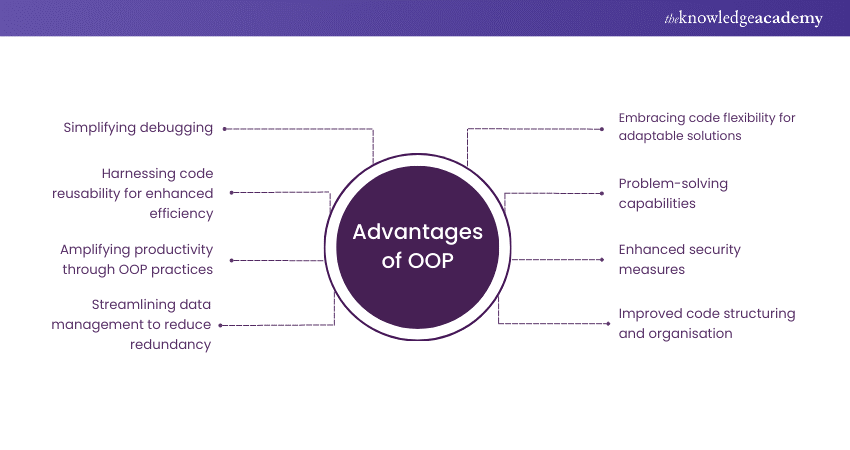We may not have the course you’re looking for. If you enquire or give us a call on +48 221041849 and speak to our training experts, we may still be able to help with your training requirements.
We ensure quality, budget-alignment, and timely delivery by our expert instructors.

Object Oriented Programming stands as a pivotal methodology in software development, offering a multitude of benefits. OOP ensures modularity, reusability, and enhanced code structure by organising design around objects rather than functions. From improved security measures to streamlined code maintenance, the Advantages of Object Oriented Programming have made it a cornerstone in contemporary programming practices. Further, in this blog, we discuss what is Object Oriented Programming and the Advantages of Object Oriented Programming.
Table of Contents
1) What is Object Oriented Programming?
2) Advantages of OOP
a) Simplifying debugging
b) Harnessing code reusability for enhanced efficiency
c) Amplifying productivity through OOP practices
d) Streamlining data management to reduce redundancy
e) Embracing code flexibility for adaptable solutions
f) Problem-solving capabilities
g) Enhanced security measures
h) Improved code structuring and organisation
3) Conclusion
What is Object Oriented Programming?
Object Oriented Programming is a computer programming model centred on structuring software design around objects or data, diverging from traditional emphasis on functions and logic. An object is characterised by unique attributes and behaviour within a data field. OOP prioritises the manipulation of objects over the intricacies of the manipulation process.
This programming approach proves particularly effective for extensive, intricate, and frequently updated programs. Examples include applications in manufacturing, design, and mobile applications, For example, Features of OOPs are often leveraged in developing manufacturing system simulation software.
Advantages of OOP
OOP offers several advantages that contribute to its widespread use in software development. Here are some key benefits:

1) Simplifying debugging
Debugging is a crucial part of software development, and OOP simplifies this process. The encapsulation of data and methods within objects ensures that each component operates independently. When an issue arises, developers can focus on the specific object or class, making identifying and rectifying errors easier. This modularity reduces the complexity of debugging, allowing for more efficient troubleshooting and faster resolution of issues.
2) Harnessing code reusability for enhanced efficiency
OOP’s emphasis on code reusability is a cornerstone of enhanced efficiency in software development. By creating modular and self-contained objects, developers can easily reuse these components across different program parts or in separate projects. This principle is particularly well-illustrated in OOPs Concepts in JavaScript, where reusability and modularity play a crucial role.
This not only accelerates the development process but also ensures consistency and reliability. Leveraging pre-built, tested objects saves time, minimises errors, and promotes more efficient use of resources, contributing significantly to overall productivity in the long run.
3) Amplifying productivity through OOP practices
Object Oriented Programming practices play a pivotal role in amplifying productivity. The principles of encapsulation, inheritance, and polymorphism allow for a clear and organised code structure. This clarity enhances collaboration among team members as the code becomes more readable and understandable. With the seamless integration of new features and the ease of maintaining existing code, OOP practices contribute to a more productive and collaborative development environment.
Unlock the power of OOP languages with our comprehensive Object Oriented Programming (OOPs) Course. Sign up now!
4) Streamlining data management to reduce redundancy
Encapsulating data within objects and exposing only essential interfaces minimises redundancy. Objects act as self-contained units, ensuring data is not unnecessarily duplicated across the codebase. This approach enhances data integrity and reduces the likelihood of inconsistencies. Additionally, OOP's emphasis on encapsulation facilitates the creation of reusable components, promoting a more efficient and organised Data Management, as demonstrated in OOPs Concepts in Java.
5) Embracing code flexibility for adaptable solutions
Object Oriented Programming fosters code flexibility, enabling the creation of adaptable solutions. Using polymorphism, inheritance, and abstraction empowers developers to write code that can accommodate changing requirements without extensive modifications. By creating generic, reusable classes and interfaces, OOP promotes the development of flexible architectures.
6) Problem-solving capabilities
Object Oriented Programming (OOP) enhances problem-solving capabilities by promoting a modular and structured approach to software design. The decomposition of a complex problem into smaller, manageable objects facilitates a clearer understanding of the system. Each object encapsulates specific functionality, enabling developers to focus on individual aspects of the problem. This modular structure simplifies debugging, maintenance, and updates.
Unlock your coding potential with our Python Course – Sign up now and embark on a journey to mastering the language of innovation!
7) Enhanced security measures
In Object Oriented Programming, security is maintained through encapsulation and abstraction. Encapsulation restricts access to an object's internal state, ensuring that only authorised methods can modify it, mitigating the risk of unauthorised tampering. Abstraction conceals intricate implementation details, reducing exposure to potential security threats.
8) Improved code structuring and organisation
OOP excels in enhancing code structuring and organisation by advocating a modular and hierarchical design approach. Classes and objects encapsulate related data and behaviours, promoting a clear and logical organisation of code. The use of inheritance facilitates the creation of a well-defined class hierarchy, simplifying the relationships between different software components. This hierarchical structure significantly improves code readability and maintainability, making it a key topic in OOPs Interview Questions.
Conclusion
Various advantages have been discussed in this blog, outlining the associated benefits of Object Oriented Programming (OOP). Owing to these favourable attributes, programming languages that incorporate OOP features have gained extensive popularity in the software development industry. Hope you enjoyed reading the blog.
Enhance your coding skills today with our diverse range of Programming Training. Join today!
Frequently Asked Questions

In Object Oriented Programming (OOP), code organisation is improved through modularity and encapsulation. OOP promotes breaking down complex systems into manageable objects, each encapsulating data and functionality. This modular approach fosters a clear, logical structure, making code more readable and maintainable.

OOP enhances security by employing encapsulation. With OOP, access to an object's internal state is restricted, reducing the risk of unauthorised tampering. This, coupled with abstraction, shields complex implementation details, making it harder for potential security threats to exploit vulnerabilities. OOP's focus on encapsulation and abstraction contributes significantly to robust security measures.

OOP facilitates code reusability through the creation of classes and objects. These components encapsulate specific functionalities and can be reused across different parts of a program or in various projects. The inheritance feature allows new classes to inherit properties and behaviours from existing ones, promoting the reuse of code. This not only enhances development efficiency but also ensures consistency and reduces redundancy in OOP-based programming.

The Knowledge Academy takes global learning to new heights, offering over 30,000 online courses across 490+ locations in 220 countries. This expansive reach ensures accessibility and convenience for learners worldwide.
Alongside our diverse Online Course Catalogue, encompassing 17 major categories, we go the extra mile by providing a plethora of free educational Online Resources like News updates, blogs, videos, webinars, and interview questions. Tailoring learning experiences further, professionals can maximise value with customisable Course Bundles of TKA.

The Knowledge Academy offers various Object Oriented Programming (OOPs) Course, including Python Course, PHP Course, Swift Training etc. These courses cater to different skill levels, providing comprehensive insights into Introduction to OOPs.
Our Programming & Devops blogs cover a range of topics related to Object Oriented Programming (OOPs), offering valuable resources, best practices, and industry insights. Whether you are a beginner or looking to advance your Project Management skills, The Knowledge Academy's diverse courses and informative blogs have you covered.

The Knowledge Academy’s FlexiPass is a pre-paid training voucher that is built specifically for clients and their dynamic needs. It provides access to a wide range of courses at a pre-determined price, with robust safety measures. FlexiPass gives clients the added benefit of upskilling on a budget that best fits them.
Upcoming Programming & DevOps Resources Batches & Dates
Date
 Object Oriented Programming (OOPs) Course
Object Oriented Programming (OOPs) Course
Fri 21st Feb 2025
Fri 25th Apr 2025
Fri 20th Jun 2025
Fri 22nd Aug 2025
Fri 17th Oct 2025
Fri 19th Dec 2025







 Top Rated Course
Top Rated Course



 If you wish to make any changes to your course, please
If you wish to make any changes to your course, please


